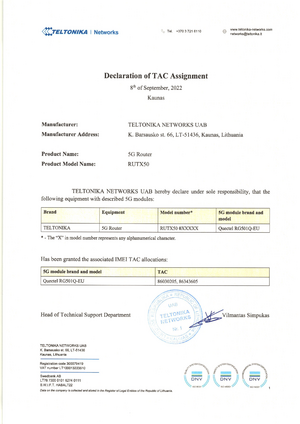RUTX50 TAC codes
The Type Allocation Code (TAC) is the initial eight-digit portion of the 15-digit IMEI and 16-digit IMEISV codes used to uniquely identify wireless devices.
Description
The Type Allocation Code identifies a particular model (and often revision) of wireless device for use on a GSM, UMTS or other IMEI-employing wireless network.
The first two digits of the TAC are the Reporting Body Identifier. This indicates the GSMA-approved group that allocated the TAC.
Prior to January 1, 2003, the global standard for the IMEI started with a six-digit Type Approval Code followed by a two-digit Final Assembly Code (FAC). The Type Approval Code (also known as TAC) indicated that the particular device was approved by a national GSM approval body and the FAC identified the company that had built and assembled the device (which is not always the same as the brand name stamped on the device). Effective on that date, many GSM member nations and entities (mainly Europe) moved away from requiring that devices be approved by national bodies, and towards a system where device manufacturers self-regulate the device market. As a result, a manufacturer now simply requests an eight-digit Type Allocation Code for a new device model from the international GSM standards body, instead of submitting a device for approval to a national review body. Both the old and new TAC uniquely identify a model of a device, although some models may have more than one code, depending on revision, manufacturing location, and other factors.
TAC codes
TAC codes for RUTX50 devices are listed in the table below:
| Production code | Region (operator) | TAC code | GSMA document (PDF) |
|---|---|---|---|
| RUTX50 0***** | Europe1, the Middle East, Africa, Oceania, Brazil | 86030205 86343605 |
Download Download |
1 - Regional availability - excluding Russia & Belarus.
Attachments
 |
To download a PDF version of the declaration, click here.
